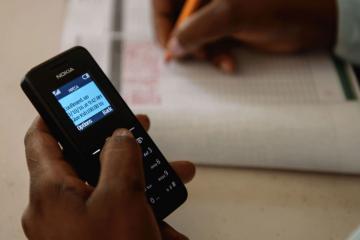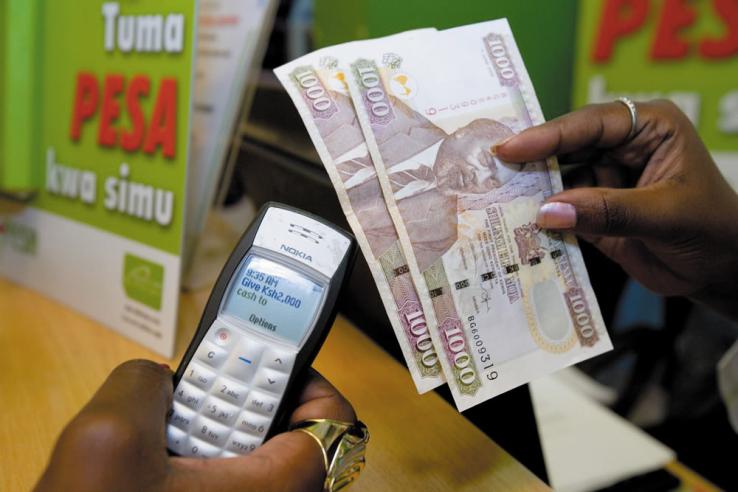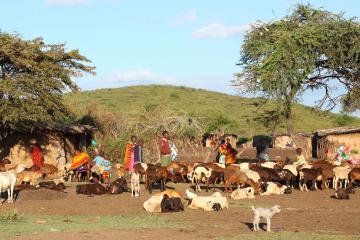
The role of a (digital) universal basic income in supporting pandemic resilience

COVID-19 and the resulting economic recession have disproportionately affected already vulnerable individuals. Governments across the world have responded with an unprecedented expansion in their social protection programming.
There is also a push towards digital transfers to be able to safely transfer cash while curbing the spread of the disease. While there is evidence on the efficacy of grants during non-pandemic times, we know little about the effect of transfers during large shocks.
For example, during COVID-19, cash grants might prove inadequate in stimulating the supply of goods and services as it is a demand-side intervention. So, are cash transfers helpful in responding to the pandemic? More specifically, to what extent could a pre-existing universal basic income build resilience to future shocks?
J-PAL Africa’s Digital Identification and Finance Initiative (DigiFI) was launched in 2019 to fund innovative research to help answer questions like this. In 2020, we funded follow-up surveys to a 2017 study on universal basic income in Kenya to identify whether the program helped recipients adjust to shocks resulting from the COVID-19 pandemic.
The study: The effects of a universal basic income (UBI) in Kenya
In 2017, Abhijit Banerjee, Michael Faye, Alan Krueger, Paul Niehaus, and Tavneet Suri, in collaboration with Innovation for Poverty Action (IPA) and GiveDirectly, launched a randomized controlled trial in Kenya to test the effectiveness of a UBI in eradicating extreme poverty.
A UBI is a specific form of social protection: an unconditional cash transfer large enough to meet basic needs and delivered to everyone within a community. One of the arguments put forth by advocates of UBI is that the transfers provide a form of insurance against uninsurable or unpredictable risks (read a more extensive discussion of the potential benefits of UBI here).
Responding to the need for rigorous large-scale experimental evidence to support the debate, researchers designed and launched a field experiment evaluating the impacts of UBI in 2017 in Bomet and Siaya counties of Kenya.
Participants in the study were randomly assigned into four groups, three of which received digital cash transfers with varying frequency and size:
- One group received a large lump-sum transfer at the beginning of 2018,
- One group was assigned a smaller long-term transfer scheduled to be received regularly for twelve years,
- One group was assigned a short-term transfer for two years that had largely been concluded prior to the COVID survey, and
- A final group was assigned not to receive any transfer and is the comparison group.
Assessing UBI in light of COVID-19
The COVID-19 pandemic unfortunately served as a unique opportunity to examine to what extent a UBI can mitigate the impact of a large shock.
Against this backdrop, the researchers conducted (and will continue to conduct) phone surveys in May 2020 to measure the effects of the pandemic and how they were mitigated by a UBI. To assess how outcomes in the COVID survey have changed since the onset of the pandemic, they compared this to data from the standard endline survey of households conducted between August and December of 2019.
It is unclear if the positive effects of social protection transfers found during “normal times” (Bastagli et al., 2019) will hold during the pandemic. Concerns around supply chain disruptions may limit the effectiveness of demand-side interventions such as a cash grant. In addition, when examining non-material outcomes such as depression, the negative psychological impacts may have been too great for the cash transfer to have had any meaningful effect.
Results from this project provide some of the first evidence of the impacts of social protection programs during the pandemic.
The UBI led to modest but statistically significant improvements in well-being
Reduced hunger and physical and mental illness
There were modest (though significant) impacts of the UBI on recipients’ personal well-being in all three groups that received cash transfers (lump-sum, long-term transfer, and short-term transfer).
Roughly two-thirds of households (68 percent) that did not receive the UBI experienced hunger. Recipients of the UBI were 4.9–10.8 percentage points less likely to report experiencing hunger during the last thirty days prior to the COVID survey.
Recipients of the UBI were also 8–13 percent less likely to have had a household member sick during the thirty days prior to the May 2020 survey. Given the very low prevalence of the coronavirus in the areas studied at the time of the surveys (twelve cases total), these illnesses were almost certainly not COVID-19 cases.
Finally, recipients were significantly less depressed in the short-term and long-term arm, though not the lump-sum arm.
No harmful impact of UBI on public health and some evidence that it was helpful
Recipients of the UBI were significantly less (10–16 percent) likely to seek medical attention in the last thirty days, as they were less sick. This would have resulted in a decreased burden on hospitals and could have been helpful in freeing up public health system capacity which is vital during the pandemic.
In addition, there is some evidence that the UBI reduced social interactions—such as visiting friends or relatives—which could reduce COVID-19 infections in the future.
Mixed effects on resilience to large aggregate shocks
Regular and long-term transfers are likely to affect investment decisions and hence resilience to large shocks. On one hand, a long-term transfer could allow the individual to buy assets to buffer against any income shocks. On the other hand, the long-term transfer may encourage recipients to increase their exposure to riskier choices, such as starting a business.
It is particularly interesting to compare the impacts of the UBI before and during COVID times to see how beneficiaries coped with the pandemic. An important caveat is that these results could be driven by seasonality and not the pandemic. As the researchers learn more, we will update the results.
-
No effect on incomes: Long-term, regular transfers led to an increase in risk-taking commercial activities. Pre-COVID, beneficiaries had diversified their income streams by creating new non-agricultural enterprises, which resulted in an increase in profits without substantial changes in labor or agricultural earnings.
However, when the pandemic hit these enterprises were not spared and the income gains they witnessed pre-COVID were wiped out but they did not close down.
-
Higher resilience to hunger in the agriculture lean season: The UBI provides households with a safety net and hence a reduced risk of hunger. This allows them to take on more income risk. As discussed above, beneficiaries of the UBI were more likely to not go hungry during the pandemic.
This was also seen prior to the pandemic during the lean season (the season between planting and harvesting), which saw a significant reduction in the number of households who experienced hunger in the UBI transfer group.
However, during the harvest season (August–December 2019), there were no significant differences in hunger between the groups that did and did not receive the transfers.
UBI: Unlikely tool of choice to respond to unanticipated shocks
While access to a UBI prior to and during a large shock improves well-being in the wake of said shock, it is an unlikely choice of tool to respond in such contexts. This is because the income gains from the UBI pre-pandemic are wiped out during the pandemic. This fits well with the theory that a UBI encourages risk-taking by providing a safety net. Hence, it is likely that recipients of a UBI have increased exposure to shocks.
Further, it would likely be more effective to use a targeted response tailored to protect those worst affected by a crisis. This is by no means a criticism of UBI but rather a remark on its appropriateness in different contexts.
Another key message from these results is the importance of supplemental income during large shocks such as the COVID-19 pandemic. These results highlight the need for infrastructure that allows cash grants to be provided universally or to a large proportion of the population in response to unanticipated crises.



